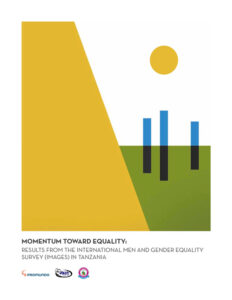Results from the International Men and Gender Equality Survey (IMAGES) in Tanzania launch today in Dar es Salaam, revealing a complex picture of men’s and women’s roles and realities in the country.
 Produced by Equimundo in partnership with UMATI and TACAIDS, the International Men and Gender Equality Survey (IMAGES) – one of the most comprehensive household studies ever carried out on men’s and women’s attitudes and practices on a wide variety of topics related to gender equality – launches today in Tanzania.
Produced by Equimundo in partnership with UMATI and TACAIDS, the International Men and Gender Equality Survey (IMAGES) – one of the most comprehensive household studies ever carried out on men’s and women’s attitudes and practices on a wide variety of topics related to gender equality – launches today in Tanzania.
The research provides new data and insights to understand how men’s and women’s gendered attitudes, behaviors, and norms impact a range of well-being and development outcomes, from sexual and reproductive health to caregiving, violence, laws and policies, and more.
The study, published in the report Momentum Toward Equality, combines a household survey conducted with over 2,000 men and women across five regions on Tanzania with qualitative research focused on understanding the gendered dynamics shaping the lives of Tanzanian adolescents and young adults. It breaks new ground as the first IMAGES study – of more than 40 that have been conducted worldwide – to include adolescent respondents under the age of 18, collect time-use data, and measure both gender-related social norms and individual attitudes.
While the study finds high rates of intimate partner violence and homophobia, as well as rigid ideas about gender roles, individuals in general report personal attitudes that are more progressive than their perceptions of behaviors and expectations in the community. These differences between personal attitudes and perceptions of social norms offer an important space and opportunity for change, with the ability to create more social acceptance around these ideals.
Furthermore, the study identifies certain factors associated with those men who are less likely to use violence and who are more supportive of gender equality, including having more educated fathers and having fathers who modeled equitable decision-making.
IMAGES in Tanzania unveils the following key findings:
- Most men and women reject a zero-sum view of gender equality in theory, but they are less supportive of transforming gender roles at home: While only 21% of men and 16% of women say that “more rights for women means that men lose out,” 71% of women and 63% of men still believe that a woman’s most important role is to take care of the home and cook for the family.
- Rates of homophobia are nearly ubiquitous among respondents: About 90% of respondents say that they would not have a gay friend and that they would be ashamed if they had a gay son.
- Women continue to spend 2.5 times as many hours as men do on household tasks in Tanzania: The study’s time-use data show that women spend nearly 30 hours per week on cooking, cleaning, doing laundry, fetching water, and going to the market, while men spend just over 12 hours per week on these tasks.
- Men who saw their fathers participate in household tasks are more likely to do so, showing intergenerational benefits for equality in unpaid care: 45% of men whose fathers participated in household tasks in their childhood homes report that they themselves now perform these tasks as adults, as compared to 29% of men whose fathers did not participate.
- Adolescents are more likely than adults to use condoms the first time they have sex, but they are less likely to have been tested for HIV: 1 in 3 adolescent men and nearly 40% of adolescent women used a condom at first sex – more than the proportion of adult men and women (28% and 19% respectively) who reported condom use at first sex. 59% of adolescent men and 30% of adolescent women have never been tested for HIV, while only 18% of adult men and 5% of adult women have never been tested.
- Lifetime rates of intimate partner violence in Tanzania are very high, and three-quarters of men report using controlling behaviors: 3 in 5 women report ever experiencing physical or economic violence, 1 in 3 sexual violence, and over 60% emotional violence. 3 in 4 men report using at least one controlling behavior with their intimate partner, such as the man having more say in important decisions affecting the couple, needing to know where the woman is all the time, or expecting his partner to agree to sex when he wants it.
The findings from IMAGES Tanzania illuminate potential areas for pushing the gender-equality agenda forward in the country through structural, inter-generational, and community-based approaches:
- Gender-transformative programming and violence-prevention efforts in Tanzania, as in many other places, will likely achieve greater impact if they account for food insecurity and economic stress, for example, through the provision of cash, food, in-kind transfers, or income-generation supports, given the high rates of economic hardship reported by both men and women.
- Tanzanian fathers do care and want to care for their children, and men are generally supportive of adolescents’ access to and use of contraception, suggesting opportunities to engage men as fathers, alongside mothers, via parent training, in promoting gender equality, achieving reductions in violence against children and women, and promoting adolescent sexual and reproductive health and rights.
- Women and men consistently hold more equitable views and are more supportive of equality for women than they perceive other individuals in their community to be, and men’s low reported use of intimate partner violence compared to women’s rate of experiencing it suggests that men know violence is socially unacceptable. Positive, or non-deficit, approaches and social-norms-change approaches can provide a strong foundation for bystander or related interventions that educate men to act on what they know or perceive is “right.” Future campaign work targeting men can emphasize the positive: “You agree that violence is wrong. Now let’s put an end to it.”

